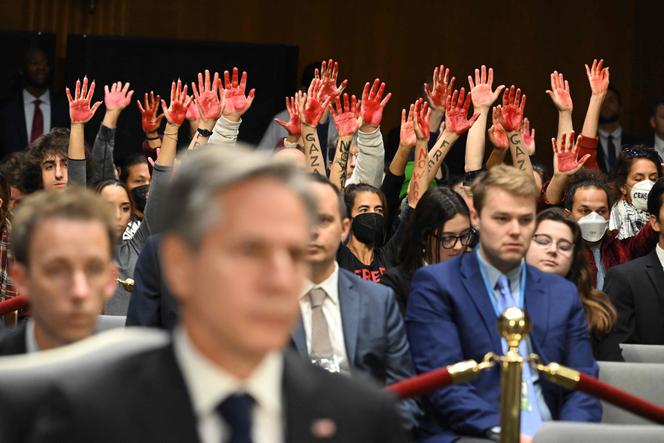


With shouts of interruption, activists raising hands painted blood red, the word "Gaza" on their bare arms, Secretary of State Antony Blinken's speech to the Senate on October 31 was an eventful one. The head of American diplomacy kept a tight rein on his words. There weren't many disrupters, but their presence symbolized the current pressure on President Joe Biden's administration. The next day, at an election rally in Minneapolis, the president himself was interrupted by a rabbi, calling for an immediate ceasefire in Gaza. This pressure is likely to increase in the coming weeks, both politically and in terms of security.
In addition to the danger of a regional war in the Middle East, the White House faces a complex domestic problem. The first dimension concerns relations between Biden and the left. The president's empathetic stance and expressed support for Israel have been so forceful as to drown out concern for humanitarian access to Gaza or official mentions of the laws of war. However, the center of gravity has shifted among Democrats in recent years. A poll published by the Gallup Institute in March showed that for the first time in more than two decades, more of them (49%) recognized an affinity with Palestinians than with Israelis (38%).
After two and a half years of remarkable discipline in the Democratic camp in backing the president, the plight of civilians in Gaza is causing unprecedented turmoil. It puts the administration at odds with the progressive wing, and more broadly with young voters and minorities of color, whose support will be decisive in the November 2024 presidential election.
In Congress, dissension emerged when 15 House Democrats refused to sign a symbolic bipartisan resolution in support of Israel, denouncing the Hamas attack. A cautiously worded letter signed by 55 elected officials then condemned the "horrifying terrorist attack," while calling on the White House to "take all due measures to limit harm to innocent civilians" in Gaza. On October 30, five representatives introduced a resolution, this time clearly calling for a ceasefire. They were Rashida Tlaib (Michigan), Cori Bush (Missouri), André Carson (Indiana), Summer Lee (Pennsylvania) and Delia Ramirez (Illinois). Eight other Democrats, including Alexandria Ocasio-Cortez (New York), then joined their initiative. All were Black or Hispanic.
But the use of the word "ceasefire" does not at all correspond to the official position of the White House, which insisted for the time that "Israel has a right, and indeed a duty" to defend itself, following the attack on October 7. On NBC, the leader of the progressive caucus in the House, Pramila Jayapal (Washington), issued a warning: "This is not a situation that is going to help either advance our long-term strategic goals of taking out Hamas, of ensuring security and peace for both Israelis and Palestinians or, frankly, our ability to hold our moral authority on the world stage by ensuring that Israel follows the international humanitarian laws."
You have 65% of this article left to read. The rest is for subscribers only.
